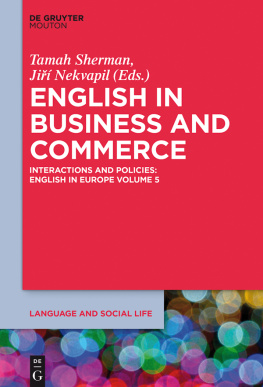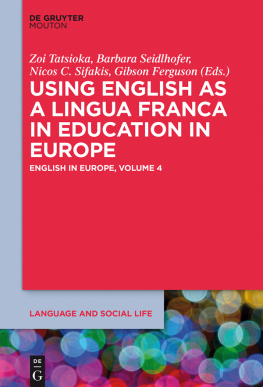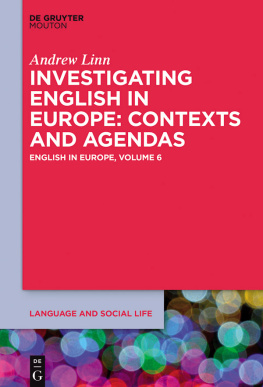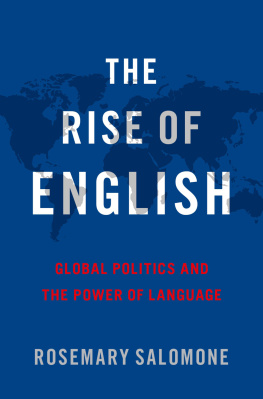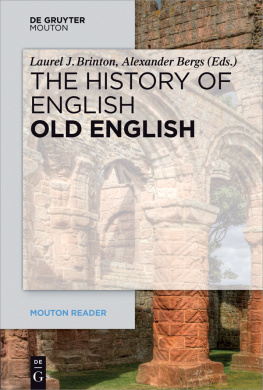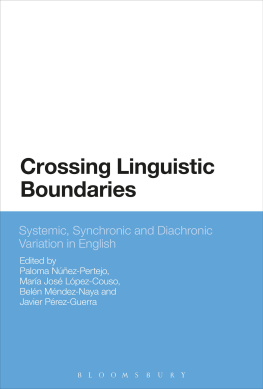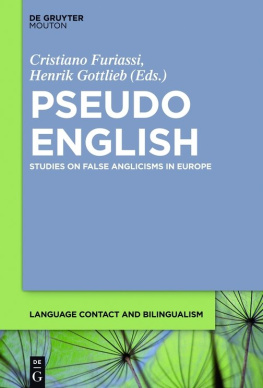Contents
Guide

Tamah Sherman, Ji Nekvapil (Eds.)
English in Business and Commerce
Language and Social Life

Editors
David Britain
Crispin Thurlow
Volume 14
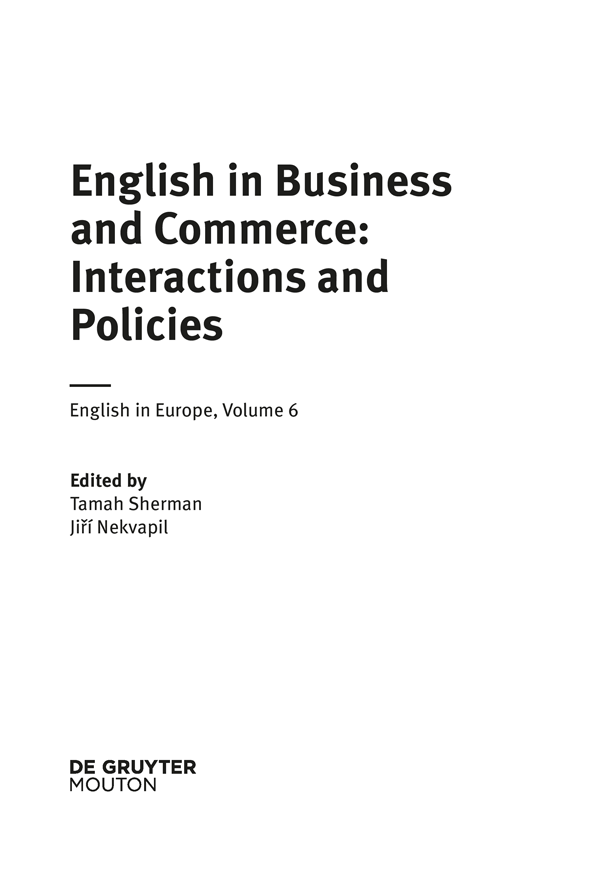
ISBN 978-1-5015-1553-8
e-ISBN (PDF) 978-1-5015-0683-3
e-ISBN (EPUB) 978-1-5015-0675-8
ISSN 2364-4303
Library of Congress Control Number: 2018934496
Bibliographic information published by the Deutsche Nationalbibliothek
The Deutsche Nationalbibliothek lists this publication in the Deutsche Nationalbibliografie; detailed bibliographic data are available on the Internet at http://dnb.dnb.de.
2018 Walter de Gruyter, Inc., Boston/Berlin
www.degruyter.com
Series preface
The biggest language challenge in the world today is English. School children are expected to learn it, and the need to succeed in English is often fired by parental ambition and the requirements for entry into higher education, no matter what the proposed course of study. Once at university or college, students across the globe are increasingly finding that their teaching is being delivered through the medium of English, making the learning process more onerous. Universities unquestioningly strive for a greater level of internationalization in teaching and in research, and this is in turn equated with greater use of English by non-native speakers. The need to use English to succeed in business is as much an issue for multinational corporations as it is for small traders in tourist destinations, and meanwhile other languages are used and studied less and less. On the other hand, academic publishers get rich on the monolingual norm of the industry, and private language teaching is itself big business. In the market of English there are winners and there are losers.
The picture, however, is more complicated than one simply of winners and losers. What varieties of English are we talking about here, and who are their native speakers? Is there something distinct we can identify as English, or is it merely part of a repertoire of language forms to be called upon as necessary? Is the looming presence of English an idea or a reality, and in any case is it really such a problem, and is it really killing off other languages as some commentators fear? Is the status and role of English the same in all parts of the world, or does it serve different purposes in different contexts? What forms of practical support do those trying to compete in this marketplace need in order to be amongst the winners?
These are all questions addressed by the English in Europe: Opportunity or Threat? project, which ran from January 2012 to October 2014. This international research network received generous funding from the Leverhulme Trust in the UK and was a partnership between the universities of Sheffield (UK), Copenhagen (Denmark) and Zaragoza (Spain), Charles University in Prague (Czech Republic) and the South-East Europe Research Centre in Thessaloniki (Greece). Each of the partners hosted a conference on a different topic and with a particular focus on English in their own region of Europe. During the course of the project 120 papers were presented, reporting on research projects from across Europe and beyond, providing for the first time a properly informed and nuanced picture of the reality of living with and through the medium of English.
The English in Europe book series takes the research presented in these conferences as its starting point. In each case, however, papers have been rewritten, and many of the papers have been specially commissioned to provide a series of coherent and balanced collections, giving a thorough and authoritative picture of the challenges posed by teaching, studying and using English in Europe today.
Professor Andrew Linn
Director, English in Europe project
Acknowledgements
We would like to thank all our contributors for the tremendous efforts they put into writing and revising their chapters, and for reviewing chapters of their colleagues. The reviewers also included Hartmut Haberland, Anna Kristina Hultgren, Petr Kaderka and Stephanie Rudwick.
We are grateful for the cooperation of the Czech Language Institute, Czech Academy of Sciences, both in the co-organization of the Prague conference and in the later provision of institutional support for the editing work by Tamah Sherman.
Ji Nekvapils work was supported by the Charles University project Progres 4, Language in the shifting of time, space, and culture.
Finally, the completion of the book would not have been possible without Andrew Linn, the coordinator of the Leverhulme Trust project English in Europe: Opportunity or Threat?, as well as the other project members in Sheffield, Zaragoza, Copenhagen and Thessaloniki.
The editors
Contributors
Jo Angouri is Reader and Director of Undergraduate Studies in Applied Linguistics at the University of Warwick, UK and a Visiting Distinguished Professor at Aalto University, School of Business. Her research expertise is in sociolinguistics, pragmatics and discourse analysis. She has carried out research in a range of corporate and institutional contexts and her work concerns both online and face to face interaction. She has published work on language and identity as well as teamwork and leadership in medical settings. She has recently completed a monograph on Culture, Discourse, and the Workplace (Routledge, 2018) and has co-edited a volume on Negotiating Boundaries at Work (EUP, 2017). Her work also includes a multidisciplinary project on migration and access to the labor market.
Elisabeth Barakos is Lecturer in Applied Linguistics at the School of Languages and Social Sciences at Aston University Birmingham. She obtained her doctorate in sociolinguistics at Vienna University and worked as research assistant and lecturer of Business English Communication at Vienna University of Economics and Business. In her PhD thesis she examined corporate bilingualism and language policy in workplaces in Wales through the lens of critical discourse studies. Her research interests include language and communication in education and workplace settings in the globalized new economy, linguistic minorities as well as multilingualism policy and practices from a critical sociolinguistic angle. Her current research investigates the management, promotion and experience of language work and elite multilingualism at language education companies through a discourse-ethnographic lens.
Sonja Barfod holds a PhD from Roskilde Universitys Department of Communication and Arts. Her doctoral thesis is about language choice in international informal workplace settings and examines the interaction between multilingual employees in a Danish company to see how the local language (Danish) is used in conjunction with the global language (English) and particularly, with the regional languages (German, Swedish, and Norwegian). The thesis is a subproject of the Lingcorp research project, which analyses the challenges many corporations experience today as a consequence of the linguistic and cultural diversity present in their staff structures.
Neil Bermel is Professor of Russian and Slavonic Studies at the University of Sheffield. His research has focused on the history of standardization practices in Czech, on ideologies in Czech language planning, and on variation in the contemporary Czech language.

